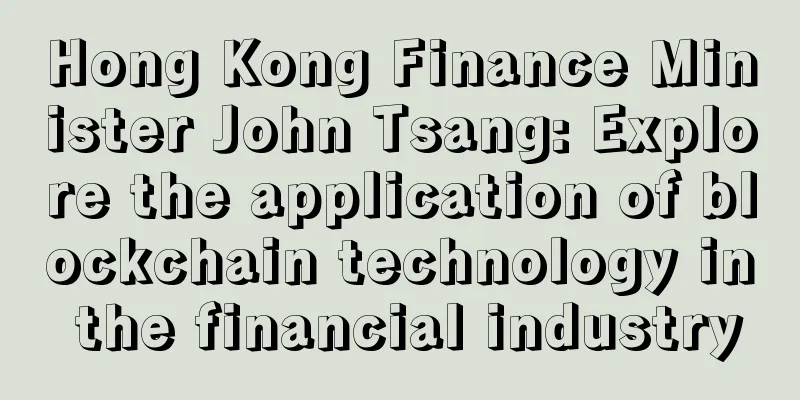Hong Kong Finance Minister John Tsang: Explore the application of blockchain technology in the financial industry

|
Hong Kong's Economic Daily published an article stating that Financial Secretary John Tsang proposed exploring the application of blockchain technology in the financial industry in his budget. I believe this is the first time many Hong Kong people have heard of the term blockchain. Blockchain is actually the accounting method behind Bitcoin, which was hotly discussed two years ago. Traditional financial transactions rely on central clearing institutions to verify and ensure that transactions are correct. The related work is complicated. For example, the Hong Kong stock market must settle funds two days after the transaction (T+2). Blockchain abandons a single intermediary, and independent individuals around the world jointly verify transactions through the execution of encryption procedures. The process can be completed within a few minutes and also reduces a large number of manpower. This article is of great reference significance. Blockchain is actually a trading technology derived from Bitcoin. Blockchain is actually a transaction technology derived from Bitcoin. After Bitcoin started to be hyped two years ago, it has attracted the attention of the financial industry. The industry is generally optimistic about blockchain technology and believes that it has the potential to greatly reduce transaction costs when applied to remittances and settlements. The multinational banking group Santander estimates that the banking industry can save up to US$20 billion each year through blockchain. No wonder many US financial giants such as Goldman Sachs, Credit Suisse, and JPMorgan Chase are exploring related technologies. Blockstream, one of the world's major blockchain R&D companies, accepted an interview with this newspaper to explain the unique advantages of blockchain and the areas with the greatest application potential. Fintech has been on the rise globally in recent years, including various areas, such as electronic wallets that revolutionize payment methods; new financing platforms such as crowdfunding and P2P lending; and blockchain involving transaction technology. In Hong Kong, from the budget last Wednesday to the Fintech Steering Group Report released last Friday, it can be seen that the government has different attitudes towards different areas. Hong Kong government pushes for reform of traditional financial industryThe government is relatively conservative about crowdfunding and P2P lending platforms, which are mostly operated by start-ups. The Secretary for Financial Services and the Treasury, Professor Paul Chan, even stated that there is no need to make major changes to the law for them. At the same time, the government is much more proactive about some innovations that can be carried out through the traditional financial industry. For example, the Payment Systems and Stored Value Instruments Ordinance, which came into effect at the end of last year, encourages the industry to launch new payment tools. As for blockchain technology, the government's attitude can be said to be the most positive. Chan even said that it is expected to subvert and reduce transaction costs. What exactly is blockchain? Why is it favored by the government? Blockchain is actually the accounting method behind the popular Bitcoin two years ago. Traditional financial transactions rely on central clearing institutions to verify and ensure that transactions are correct. The related work is complicated. For example, the Hong Kong stock market must settle funds two days after the transaction (T+2). Blockchain abandons a single intermediary and allows independent individuals around the world to jointly verify transactions through the execution of encryption procedures. The process can be completed in a few minutes and also reduces a lot of manpower. US startup alliances are being joined by giant companiesThe Hong Kong government is not the only one that is optimistic about the technology. Regional blockchain has attracted more than US$1 billion in investment worldwide. As early as September last year, the US startup R3 established an alliance and invited financial institutions to join in the joint research on how to apply blockchain in the financial industry. So far, 42 companies have joined, and almost all the giants in the US financial industry are members. In December last year, Li Ka-shing's Horizons Ventures also joined forces with several funds to invest US$55 million in the related startup Blockstream. Blockstream is a leader in upstream blockchain technology. Its co-founder and CEO Austin Hill told our reporter that blockchain technology can be applied to remittances, payments, settlements and other areas, and its operation has advantages over the current financial industry: "The traditional system needs to check the ledgers of both parties to the transaction, which itself requires a lot of work. On top of that, there are also regulatory issues. Are the ledger operators following the rules? Are the transactions legal? The biggest problem in the financial industry today is the contradiction between regulation and cost savings. Some large banks have to hire tens of thousands of people just to meet new regulatory requirements, which is a huge waste of manpower." Decentralized network enables real-time accountingHe explained that the way blockchain works is to give the ledger to everyone, and then use cryptography and mathematics to ensure that everyone holds the same version of the ledger. "Accounting and auditing are real-time, and every transaction must be true and verified in a few minutes. No one can cheat the system." Hill pointed out that another advantage of blockchain is that the network is decentralized, so there will be no risk concentration like a single settlement institution. He believes that the openness of blockchain technology, compared with a closed trading system, may develop a completely unimaginable ecosystem in the long run. High technical threshold and the team comes from a giant companyBlockchain technology has a high barrier to entry, and most of the industry's major start-ups are from the United States. For example, Blockstream, which is at the upstream of the industry, focuses on building a "Sidechain" system for customers that can be connected to the Bitcoin blockchain. The company's executive team comes from Google, Microsoft, etc., and many of them are core developers of Bitcoin. Hong Kong company uses technology to launch remittance websiteHowever, in fact, some people in Hong Kong have started businesses using blockchain, focusing on downstream applications in the industry. For example, Bitspark, whose office is in Cyberport, uses this technology to launch an online remittance platform. The company was established in April 2014 and claims to be faster and safer. It uses Bitcoin behind the scenes, but customers will not be exposed to it during the process. The company claims that its handling fee is about 1%, which is only one-third of that of traditional remittance agencies; the market is mainly in the Philippines and Indonesia, and many customers are foreign domestic workers. Austin Hill, CEO of Blockstream, added that another benefit of sending money through blockchain is that every transaction can be traced. "Today, with FedEx, you can track the location of the package. The amazing thing is that the SWIFT network used for international remittances has no tracking system. In my personal experience, an investor sent us $10 million, and it disappeared. It took seven days to find out where it went. I called the bank, and they called another bank. SWIFT was invented 25 years ago and uses private telephone lines to transfer, with a failure rate of 4%. This is not a problem with SWIFT, but a problem with all traditional technologies. Over time, regulations such as confirming customer identities and anti-money laundering must be added. It was not originally designed to be used this way." International remittance payments are expected to develop rapidlyBlockchain has many potential uses. Blockstream CEO Austin Hill estimates that areas such as remittances and international payments will develop faster, while settlement work is expected to take longer as it involves more complex supervision. Settlement involves complicated supervision and takes a long timeHill said that the actual application of blockchain in remittance and international payment has actually begun: "Someone has already written an app for fast remittance, using Bitcoin behind the scenes, but users may not know it. Now if you want to do cash on delivery with a Chinese supplier, there will be 4 to 5 bank partners involved. A transfer of 4,000 yuan will cost at least 130 or 140 yuan. Transferring 4,000 yuan is not bad, but if you sell something for 50 yuan, the cost is about the same." He pointed out that transfers between different banks, such as cheques and transfers, sometimes take up to 7 to 10 days, and a large amount of liquidity is locked up. "The settlement of interbank balances is a big problem, involving a large number of third parties." Hill revealed that Blockstream has cooperated with financial institutions around the world to build test models for them. However, he pointed out that applying blockchain to clearing work is expected to take a long time because it is necessary to cooperate with exchanges or central clearing banks and convince regulators first: "Banks and exchanges must first build prototypes and do pilot tests, which usually takes 3, 5, or 7 years." In the long run, Hill said blockchain technology could also lead to "smart contracts" that could add business contracts and even trust to "money". "For example, if you gamble with someone, the money Chelsea wins will automatically become yours without anyone having to transfer the money. Some people also wonder if stocks could be added to the blockchain, so that after the transaction, they can issue their own proof of ownership." |
<<: Hong Kong Roundtable AMA - Conversation with Wu Jihan
>>: South Korean exchanges enter blockchain field and develop blockchain trading system
Recommend
When will women with double ingot patterns on their palms become rich?
Palmistry has three origins: Western, Indian and ...
Are people with sunken brows really selfish? What is the personality of people with sunken brows?
People with sunken foreheads are very selfish You...
IPFS Weekly Issue 104: Quick Reading of Important Events This Week
Welcome to IPFS Weekly The InterPlanetary File Sy...
The evil things changed his appearance
The evil things changed his appearance Humans hav...
Noah Chain received 20 million strategic investment from multiple investment institutions including Jidou Capital and Keyin Capital
On July 1, 2018, Beijing time, the NOAT public ch...
Why I Hope Bitcoin Transaction Fees Stay Low
Chapter 0 Introduction In the recent expansion co...
The most prosperous woman's face
The most prosperous woman's face Men all hope...
The palmistry of a man with a mistress
Palmistry of a man with a mistress (two wives) 1....
There is a triangle pattern in the palm
The triangle pattern is one of the miscellaneous ...
People who often surprise their significant other in life
Life needs some interesting spice to make it fun....
People with these faces can easily achieve their goals at work.
When it comes to work, people who can really make...
What kind of face shape does a woman have to bring good luck to her husband? What are the face shapes of women who bring good luck to their husbands?
Women are very worried that they will meet a bad ...
Is it good to have wrinkles on the forehead?
Maybe from the perspective of facial appearance, ...
The subtle tyranny of blockchain
The past few months have been a new chapter in th...
The face of a man who is both rich and beautiful
The face of a man who is both rich and beautiful ...









